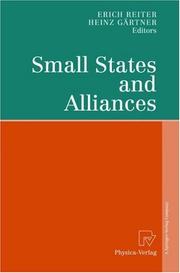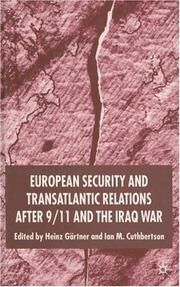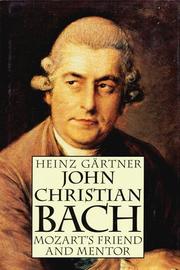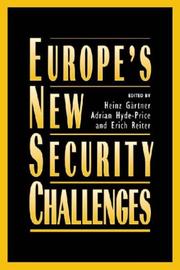| Listing 1 - 10 of 16 | << page >> |
Sort by
|
Book
ISBN: 9781498546188 Year: 2017 Publisher: Lanham, MD : Lexington Books,
Abstract | Keywords | Export | Availability | Bookmark
 Loading...
Loading...Choose an application
- Reference Manager
- EndNote
- RefWorks (Direct export to RefWorks)
The notion that neutrality is a phenomenon only relevant to the Cold War is false in many ways. The Cold War was about building blocks, neutrality about staying out of them. From 1975 until the end of the Cold War, neutral states offered mediation and good offices and fought against the stagnation of the detente policy especially in the framework of the CSCE. After the end of the Cold War, neutral states became active in peace-operations outside of military alliances. The concept of neutrality has proven time and again that it can adapt to new situations. In many ways, small neutral states have more room to maneuver than members of alliances or big powers. They have more acceptance and fewer geopolitical interests. Neutrality has been declared obsolete many times in its long and layered history, yet it has also made many comebacks in varying forms and contexts. Neutrality in the 21st century does not involve to staying out but engaging. In contrast to disengagement and staying out, engaged neutrality entails active participation in the international security policy in general and in international peace operations in particular. Engaged neutrality means involvement whenever possible and staying out only if necessary.
Book
ISBN: 093134039X Year: 1986 Publisher: Portland Amadeus
Abstract | Keywords | Export | Availability | Bookmark
 Loading...
Loading...Choose an application
- Reference Manager
- EndNote
- RefWorks (Direct export to RefWorks)
Composers --- Compositeurs --- Biography. --- Biographies --- Mozart, Wolfgang Amadeus, --- Mozart, Constanze, --- requiem --- Mozart, Constanze --- Mozart, Wolfgang Amadeus
Book
ISBN: 3700309406 Year: 1992 Publisher: Wien : Braumüller,
Abstract | Keywords | Export | Availability | Bookmark
 Loading...
Loading...Choose an application
- Reference Manager
- EndNote
- RefWorks (Direct export to RefWorks)
European cooperation. --- Nuclear arms control --- Security, International.
Book
ISBN: 3485005894 Year: 1989 Publisher: München Nymphenburger
Abstract | Keywords | Export | Availability | Bookmark
 Loading...
Loading...Choose an application
- Reference Manager
- EndNote
- RefWorks (Direct export to RefWorks)
Book
Year: 1973 Publisher: München
Abstract | Keywords | Export | Availability | Bookmark
 Loading...
Loading...Choose an application
- Reference Manager
- EndNote
- RefWorks (Direct export to RefWorks)

ISBN: 3790814032 3790824925 3662130009 Year: 2001 Publisher: Heidelberg : Physica-Verlag,
Abstract | Keywords | Export | Availability | Bookmark
 Loading...
Loading...Choose an application
- Reference Manager
- EndNote
- RefWorks (Direct export to RefWorks)
The book focuses on the relations between small states and alliances. It is on why, how and under what conditions states engage in alliances. What are the benefits and costs of alliances? How are the benefits and costs of alliances allocated among their members? What determines who allies with whom? Can small states still pursue their own security interests within an alliance? Can they even become integral part of an alliance? Scholars, practitioners, policy-makers and advisors from several countries discuss these issues. They address historical, empirical and theoretical topics and give policy recommendations.
Alliances --- States, Small --- Petits Etats --- Alliances. --- States, Small. --- International relations. --- Political science. --- European Economic Community literature. --- International Relations. --- Political Science. --- European Integration. --- Administration --- Civil government --- Commonwealth, The --- Government --- Political theory --- Political thought --- Politics --- Science, Political --- Social sciences --- State, The --- Coexistence --- Foreign affairs --- Foreign policy --- Foreign relations --- Global governance --- Interdependence of nations --- International affairs --- Peaceful coexistence --- World order --- National security --- Sovereignty --- World politics
Periodical
Abstract | Keywords | Export | Availability | Bookmark
 Loading...
Loading...Choose an application
- Reference Manager
- EndNote
- RefWorks (Direct export to RefWorks)

ISBN: 1403936854 1349518956 9786610425143 1280425148 0230502539 Year: 2004 Publisher: New York (N.Y.) : Palgrave Macmillan,
Abstract | Keywords | Export | Availability | Bookmark
 Loading...
Loading...Choose an application
- Reference Manager
- EndNote
- RefWorks (Direct export to RefWorks)
National security --- World politics --- History --- Europe --- United States --- Foreign relations --- United States. --- EUROPE--FOREIGN RELATIONS--USA --- USA--FOREIGN RELATIONS--EUROPE

Abstract | Keywords | Export | Availability | Bookmark
 Loading...
Loading...Choose an application
- Reference Manager
- EndNote
- RefWorks (Direct export to RefWorks)
Composers --- Biography. --- Bach, Johann Christian, --- Biografieën --- Muziekgeschiedenis --- Thematische catalogi --- Duitsland --- Italië --- Groot-Brittannië --- Engeland --- Bach, Johann Christian (1735-1782) --- 18e eeuw

ISBN: 1555879055 168585205X Year: 2001 Publisher: Boulder, Colo. Rienner
Abstract | Keywords | Export | Availability | Bookmark
 Loading...
Loading...Choose an application
- Reference Manager
- EndNote
- RefWorks (Direct export to RefWorks)
International relations. Foreign policy --- Polemology --- Europe
| Listing 1 - 10 of 16 | << page >> |
Sort by
|

 Search
Search Feedback
Feedback About UniCat
About UniCat  Help
Help News
News